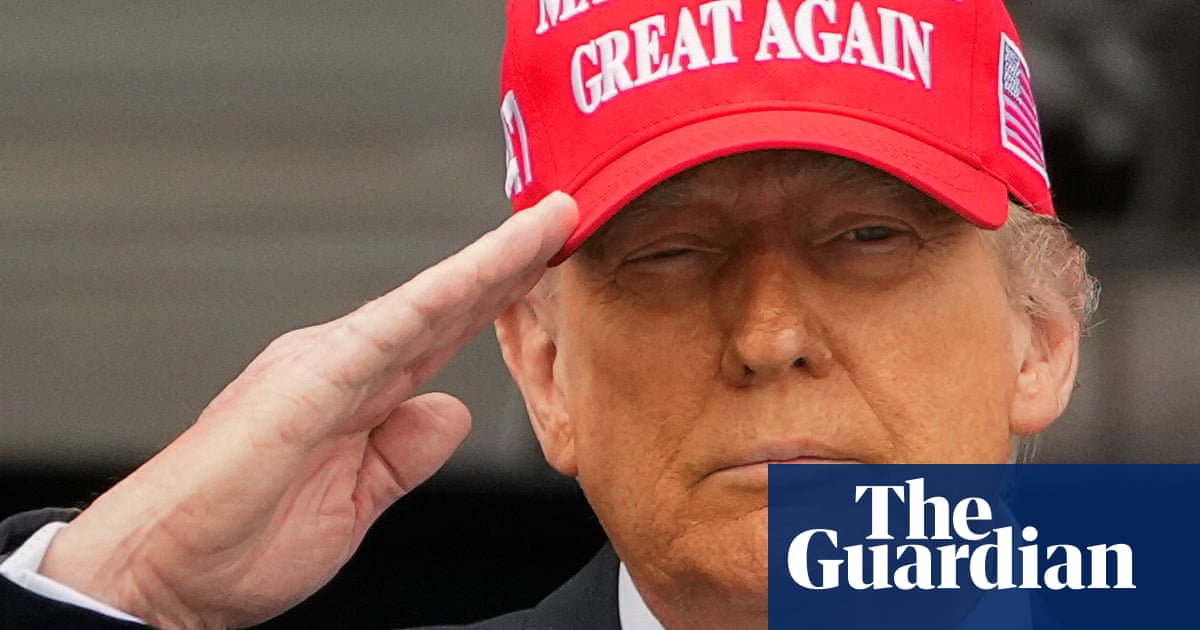Donald Trumptold graduating West Point military academy cadets on Saturday that they were entering the officer corps at a “defining moment in the army’s history”, in a commencement address that included political attacks and a discourse on the folly of older men marrying “trophy wives”.
Referring to US political leaders of the past two decades who “had dragged our military into missions” that people questioned as “wasting our time, money and souls in some case”, Trump told the young leaders that “as much as you want to fight, I’d rather do it without having to fight”. He predicted that, through a policy of “peace through strength”, the US’s adversaries would back down. “I just want to look at them and have them fold,” he said.
The president also said US soldiers had been sent “on nation-building crusades to nations that wanted nothing to do with us, led by leaders that didn’t have a clue about distant lands while abusing our soldiers with absurd ideological experiments here and at home”.
“All of that’s ended, strongly ended. They’re not even allowed to think about it anymore,” Trump added.
Making apparent reference to diversity, equity and inclusion programs that defense secretaryPete Hegsethhas cancelled, Trump weaved together criticism of his predecessors with a new focus on curbing illegal immigration.
“They subjected the armed forces to all manner of social projects and political causes, while leaving our borders undefended and depleting our arsenals to fight other countries’ wars. We fought for other countries’ borders but we didn’t fight for our own borders, but now we do like we have never fought before,” he said.
He later said that “the job of the US armed forces is not to host drag shows or transform foreign cultures”, a reference to drag shows on military bases that his predecessor Joe Bidenhaltedin 2023 after Republican criticism.
Wearing a red “Make America great again” campaign hat throughout, the president told the 1,002 graduating cadets that the US is the “hottest country in the world”, and boasted of his administration’s achievements.
The president also returned, once again, to a cautionary tale he often tells young people about the danger of losing momentum in life, illustrated by an anecdote about what he called the unhappy retirement of the post-war housing developer William Levitt, the creator of Levittowns, planned communities on Long Island, New Jersey and Pennsylvania.
Repeating a story he toldat a Boy Scout jamboree in 2017, and at the University of Alabama three weeks ago, the president said that Levitt was unsatisfied by life without work, even though he married “a trophy wife” and bought a yacht. “It didn’t work out too well, and that doesn’t work out too well, I must tell you, a lot of trophy wives, it doesn’t work out,” the presidenttoldthe young women and men. “But it made him happy for a little while at least.”
Trump also used the occasion to repeat an unfounded accusation he first made in 2020: the claim that Russia had stolen US hypersonic missile technology during Barack Obama’s presidency. “The Russians stole it, something bad happened. But we’re now building them, lots of them,” Trump said, praising eight cadets who had built their own. “We are building them right now. We had ours stolen. We are the designers of it. We had it stolen during the Obama administration.”
Outside the gates of West Point, protesters gathered with drums, banners and signs to condemn what they called the president’s attack on American democracy.
At points during Trump’s address, he veered between praising the graduating military cadets and maintaining political criticism of the Biden administration.
The graduation address, which ran to almost an hour long, comes before an expansive military parade in Washington on 14 June to celebrate the 250th anniversary celebration of the nation. The date is also the president’s birthday.
Alongside the military parade featuring more than 6,700 soldiers, it will include concerts, fireworks, NFL players, fitness competitions and displays all over the National Mall for daylong festivities. The army expects that as many as 200,000 people could attend and that putting on the celebration will cost an estimated $25m to $45m.
The Associated Press contributed reporting
